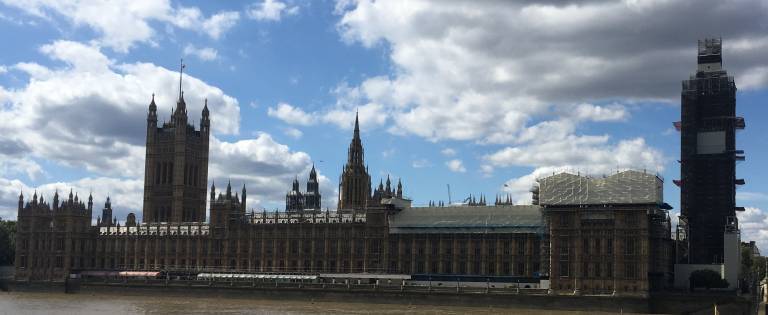The State of the Constitution: Constitution Unit Conference 2022
26 May 2022
What is the state of the constitution in 2022? What further changes are coming, and what should happen next? In partnership with the Bingham Centre for the Rule of Law, the Oxford Constitutional Studies Forum, and UK in a Changing Europe (UKICE).

Constitutional tensions are high. There are various contributing factors: the UK government’s approach to governing and its relationship with parliament and the courts; the continuing aftermath of Brexit including tensions over Northern Ireland; very different constitutional visions emerging from London, Edinburgh, and Cardiff; and scandals about standards in public life. What is the state of the constitution in 2022? What further changes are coming, and what should happen next?
This conference brings together an impressive range of speakers, including parliamentarians, academics and commentators to discuss many of the key issues in a series of subject-specific panels and a keynote address.
The conference is free to attend and will take place via Zoom webinar. It is organised by the Constitution Unit in partnership with the Bingham Centre for the Rule of Law, the Oxford Constitutional Studies Forum, and UK in a Changing Europe (UKICE).
Programme
Day 1 - Wednesday 22 June
| Time | Topic | Speakers |
|---|---|---|
| 13:30-14:45 | Constitutional Standards The Johnson premiership has sparked numerous concerns about constitutional standards – from respect for checks and balances and the rule of law, to standards of behaviour among ministers, officials, and parliamentarians. A major review by the Committee on Standards in Public Life in 2021 proposed significant change. These debates take place within a wider framework of concern about ‘democratic backsliding’. How can constitutional and democratic standards best be upheld, and norms of good behaviour be maintained? | Sir Jeremy Wright QC MP – Conservative MP for Kenilworth and Southam, and member of the Committee on Standards in Public Life Professor Elizabeth David-Barrett – Director of the Centre for the Study of Corruption, University of Sussex Sir Peter Riddell – former Commissioner for Public Appointments and Honorary Professor at UCL Professor Petra Schleiter – Joint Head of the Department of Politics and International Relations, University of Oxford Chair: Professor Meg Russell FBA – Director of the Constitution Unit, UCL |
| 14:45-15:00 | Break | |
| 15:00-16:15 | Northern Ireland: how can power-sharing be revived? Northern Ireland finds itself again without a functioning Executive or Assembly. All mainstream voices agree that the 1998 Belfast/Good Friday Agreement offers the only viable framework for politics in Northern Ireland in the coming years, but the risk of breakdown is severe. How can Northern Ireland’s power-sharing arrangements be restored in the coming months? How far are solutions to be found in changes to the Protocol or to the 1998 Agreement? And what role should the government in London play in seeking a healthy outcome? | Julian Smith MP – Conservative MP for Skipton and Ripon, and former Secretary of State for Northern Ireland Dr Mary Murphy – Department of Government and Politics, University College Cork Dr Clare Rice – Research Associate, Department of Politics, University of Liverpool Alan Whysall – Honorary Senior Research Associate at the Constitution Unit and former civil servant in the Northern Ireland Office Chair: Professor Alan Renwick – Deputy Director of the Constitution Unit, UCL |
| 16:15 | End of Day One | |
Day 2 - Thursday 23 June
| Time | Topic | Speakers |
|---|---|---|
| 09:15-10:30 | The Future of the Union and Devolution The UK’s ‘devolution settlement’ is unsettled. Alternative visions abound for how to achieve stability: through ‘muscular unionism’; by reforming intergovernmental relations; through wholesale federalisation; or by breaking up the Union. What is the current state of each of these options? How are they likely to develop in the foreseeable future? In so far as they are implemented, what impacts are they likely to have? | Lord (Andrew) Dunlop – Conservative peer, and former Parliamentary Under-Secretary of State at the Scotland Office and Northern Ireland Office Professor Laura McAllister – Wales Governance Centre, University of Cardiff, and co-chair of the Independent Commission on the Constitutional Future of Wales Sarah Sackman – Public and environmental lawyer, Matrix Chambers Professor Michael Keating – Emeritus Professor of Politics, University of Aberdeen, and Fellow of the Centre on Constitutional Change Chair: Professor Alan Renwick – Deputy Director of the Constitution Unit, UCL |
| 10:30-10:45 | Break | |
| 10:45-12:00 | The Role of the Courts The 2019 Conservative manifesto promised to review the relationship between government, parliament and the courts. In particular, ministers had concerns about the growth of judicial review. Since then, there have been consultations on judicial review and the Human Rights Act, the Judicial Review and Courts Act has reached the statute book, and the government has proposed a new Bill of Rights. Simultaneously, some detect a ‘chilling’ effect on the courts. So, in the third year of the Johnson premiership, how much rebalancing has taken place, and what might still lie ahead? | Joanna Cherry QC MP – Scottish National Party MP for Edinburgh South West and former party spokesperson on Justice and Home Affairs Sir Bob Neill MP – Conservative MP for Bromley and Chislehurst, and Chair of the Commons Justice Committee Helen Mountfield QC – barrister and Principal of Mansfield College, University of Oxford Martha Spurrier, Director, Liberty Chair: Joshua Rozenberg QC (Hon) – legal commentator and journalist |
| 12:00-12:15 | Break | |
| 12:15-13:30 | Parliament: the decline of scrutiny? Johnson’s premiership has been marked by various controversies about parliament. On COVID-19, the government was accused of overusing delegated powers – adding to already long-standing concerns in this area. Subsequently, some primary legislation has been rushed, and the relationship between whips and backbenchers often difficult. Most recently, the proposed fast-track procedures for amending Retained EU Law and on human rights risk further sidelining parliamentarians. How concerned should we be about these developments, and how best can parliament respond? | Baroness (Angela) Smith of Basildon – Labour peer, and Shadow Leader of the House of Lords William Wragg MP – Conservative MP for Hazel Grove, and Chair of the Commons Public Administration and Constitutional Affairs Committee Dr Ruth Fox – Director of the Hansard Society Dr Hannah White – Deputy Director of the Institute for Government Chair: Dr Tom Fleming – Constitution Unit, UCL |
| 13.30-16:00 | Break | |
| 16:00-17:00 | Keynote Speech Rory Stewart was Conservative MP for Penrith and the Border between 2010 and 2019. He served in government under David Cameron and Theresa May, including as a Home Office minister and Secretary of State for International Development. As a former diplomat, he served on the House of Commons Foreign Affairs and Defence Committees, the latter of which he chaired from 2014 to 2015. In 2019, he contested the Conservative Party leadership against Boris Johnson, before being stripped of the party whip over Johnson’s approach to Brexit, and then stepping down from parliament. Among other things he is currently the co-host, with Alastair Campbell, of the popular podcast 'The Rest is Politics'. | Rory Stewart |
| 17:00 | Conference close | |
Links and related Constitution Unit projects
- Bingham Centre for the Rule of Law
- Oxford Constitutional Studies Forum, University of Oxford Department of Politics and International Relations
- UK in a Changing Europe
- Constitutional Principles and the Health of Democracy
- Brexit, parliament and the constitution
- Democracy in the UK after Brexit
Image credit: Dave Busfield-Birch


 Close
Close

